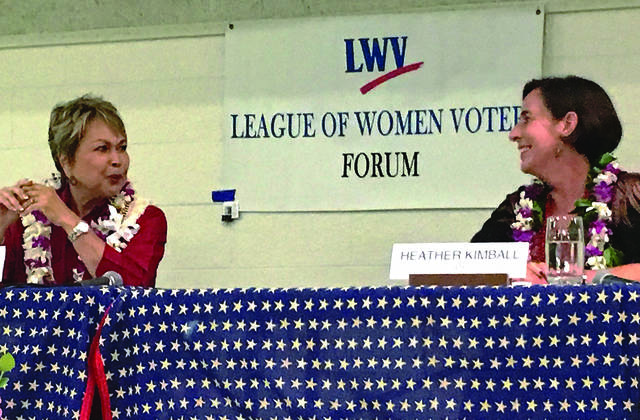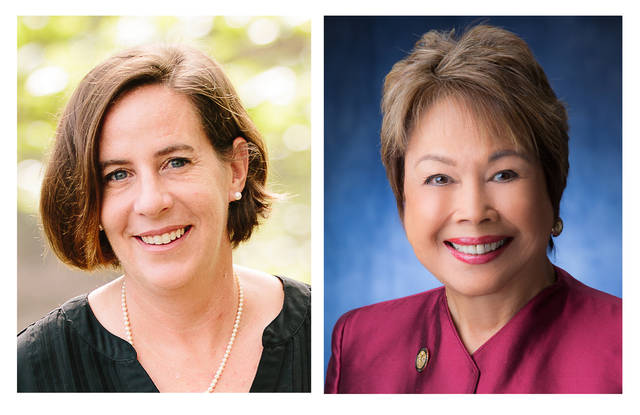KAILUA-KONA — Sen. Lorraine R. Inouye is touting a record of getting things done for the people of her district, but challenger Heather Kimball says she can bring a strategic mind well-suited to finding proactive solutions for the problems that continue to face the state and island.
The two candidates face each other in the race for State Senate District 4, an area that spans from Keahole Point on the island’s west side to Honolii in the east and north to include communities like Hawi and along the Hamakua coast.
Kimball, of Papaikou, and Inouye, of Paukaa, are the only candidates in the race, so the winner will be decided by the Democratic Party’s primary on Aug. 11.
Inouye was most recently elected senator in 2014, but prior to that, she served as senator from 1998-2008. She pointed to her record as well as the relationships she’s built as a lawmaker, saying that District 4 voters benefit from keeping an incumbent in the seat.
That record, she said, includes bringing $420 million to the district and $40 million for district schools. She also noted legislative accomplishments like “Death with Dignity,” which was signed into law earlier this year as the “Our Care, Our Choice Act,” and the prohibition of sunscreens considered damaging to coral reefs.
“And so we’ve pretty much done a lot this last couple of years,” she said.
The senator, who chairs the Senate Committee on Transportation and Energy, is the only legislator from the neighbor islands on the Hawaii Climate Change Mitigation and Adaptation Commission. She also sits on the Senate Committee on Ways and Means.
Kimball, who holds a master’s degree in environmental science and owns a consulting firm focused on land management, carbon mitigation and climate change adaption policy, said from her experience consulting with organizations that work with state agencies, she’s seen that at the state level, those trying to get things done “are always operating in crisis mode,” lacking consistent funding and reacting to problems rather than being proactive.
For the District 4 voters Kimball’s spoken to, the key issues come down to economics, including cost of living, affordable housing and access to jobs. And for Kimball, that leads to the question of how to diversify an economy beyond tourism and real estate development, which comes with an emphasis on economic and tax fairness, all of which is “all tied in” with education.
“If our children don’t see their opportunities for them here and then we aren’t also developing the types of skill sets through our education system that are needed to support, for example, a high-tech economy,” Kimball said, “then we’re not going to make any progress on that diversification of our economy.”
And looking to the district’s future, Kimball said the state and island have a great opportunity to develop its research economies, saying that while it’s too costly to import and export manufactured goods, the region can excel in importing and exporting ideas.
Hawaii, she said, can “lead the way” in research of renewable energy and storage, climate change and adaptation as well as food sustainability and small-scale agriculture.
“We used to be the prime place that people would go to around the world to study tropical agriculture, and we’ve let that fall behind,” she said. “But I think that’s something that could be restored.”
And with regard to accessible health care, an area Kimball said was a universal concern across North Hawaii, she pointed to a need for more “home-grown” physicians as a way to address the doctor shortage and supporting those who came up in the community and want to pursue medicine to live and work here.
Kimball said she supports the establishment of a teaching hospital in West Hawaii. She also raised the idea of offering funds to help people pursue a medical education with the requirement that those who receive money work here in the community with Medicare and Medicaid clients.
Inouye, meanwhile, said she doesn’t see “major, large industries coming in, but we can tap on what we’re doing right now.”
That includes ensuring farmers are able to continue operating, saying that while Waimea “used to be pretty much the breadbasket of our vegetable crops,” several farms have been sold and won’t continue with vegetable farming.
“We may lose a few farms,” she said, “but we have to make sure that we continue agriculture in that top region of North Kohala and Waimea.”
Her goal, she said, is to provide water infrastructure in that area, saying that a consultant attached to an agricultural water study has already identified alternative water sources. The state has commissioned the study to catalogue the current and future demand for water in the area and identify existing or new sources along with ways to get water where it’s needed.
She said she is also looking at ways to increase penalties for agricultural theft.
Inouye also said she’s a big supporter of the Thirty-Meter Telescope, saying the district, particularly its students, benefits from keeping astronomy here and having a relationship with the observatories and said she supports new programs at Hawaii Community College-Palamanui, including continued development of its culinary services courses.




